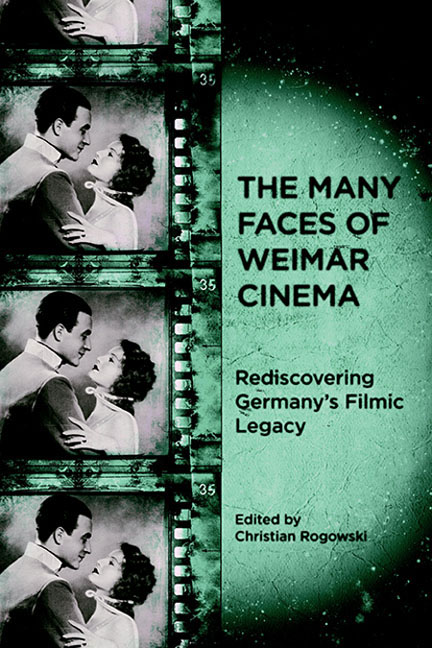Book contents
- Frontmatter
- Contents
- List of Illustrations
- Preface
- Introduction: Images and Imaginaries
- 1 Richard Oswald and the Social Hygiene Film: Promoting Public Health or Promiscuity?
- 2 Unsettling Nerves: Investigating War Trauma in Robert Reinert's Nerven (1919)
- 3 Humanity Unleashed: Anti-Bolshevism as Popular Culture in Early Weimar Cinema
- 4 Desire versus Despotism: The Politics of Sumurun (1920), Ernst Lubitsch's “Oriental” Fantasy
- 5 Romeo with Sidelocks: Jewish-Gentile Romance in E. A. Dupont's Das alte Gesetz (1923) and Other Early Weimar Assimilation Films
- 6 “These Hands Are Not My Hands”: War Trauma and Masculinity in Crisis in Robert Wiene's Orlacs Hände (1924)
- 7 The Star System in Weimar Cinema
- 8 Schaulust: Sexuality and Trauma in Conrad Veidt's Masculine Masquerades
- 9 The Musical Promise of Abstract Film
- 10 The International Project of National(ist) Film: Franz Osten in India
- 11 The Body in Time: Wilhelm Prager's Wege zu Kraft und Schönheit (1925)
- 12 Henrik Galeen's Alraune (1927): The Vamp and The Root of Horror
- 13 The Dialectic of (Sexual) Enlightenment: Wilhelm Dieterle's Geschlecht in Fesseln (1928)
- 14 Babel's Business — On Ufa's Multiple Language Film Versions, 1929–1933
- 15 “A New Era of Peace and Understanding”: The Integration of Sound Film into German Popular Cinema, 1929–1932
- 16 Landscapes of Death: Space and the Mobilization Genre in G. W. Pabst's Westfront 1918 (1930)
- 17 Undermining Babel: Victor Trivas's Niemandsland (1931)
- 18 Unmasking Brigitte Helm and Marlene Dietrich: The Vamp in German Romantic Comedies (1930–33)
- Filmography
- Notes on the Contributors
- Index
7 - The Star System in Weimar Cinema
Published online by Cambridge University Press: 29 April 2017
- Frontmatter
- Contents
- List of Illustrations
- Preface
- Introduction: Images and Imaginaries
- 1 Richard Oswald and the Social Hygiene Film: Promoting Public Health or Promiscuity?
- 2 Unsettling Nerves: Investigating War Trauma in Robert Reinert's Nerven (1919)
- 3 Humanity Unleashed: Anti-Bolshevism as Popular Culture in Early Weimar Cinema
- 4 Desire versus Despotism: The Politics of Sumurun (1920), Ernst Lubitsch's “Oriental” Fantasy
- 5 Romeo with Sidelocks: Jewish-Gentile Romance in E. A. Dupont's Das alte Gesetz (1923) and Other Early Weimar Assimilation Films
- 6 “These Hands Are Not My Hands”: War Trauma and Masculinity in Crisis in Robert Wiene's Orlacs Hände (1924)
- 7 The Star System in Weimar Cinema
- 8 Schaulust: Sexuality and Trauma in Conrad Veidt's Masculine Masquerades
- 9 The Musical Promise of Abstract Film
- 10 The International Project of National(ist) Film: Franz Osten in India
- 11 The Body in Time: Wilhelm Prager's Wege zu Kraft und Schönheit (1925)
- 12 Henrik Galeen's Alraune (1927): The Vamp and The Root of Horror
- 13 The Dialectic of (Sexual) Enlightenment: Wilhelm Dieterle's Geschlecht in Fesseln (1928)
- 14 Babel's Business — On Ufa's Multiple Language Film Versions, 1929–1933
- 15 “A New Era of Peace and Understanding”: The Integration of Sound Film into German Popular Cinema, 1929–1932
- 16 Landscapes of Death: Space and the Mobilization Genre in G. W. Pabst's Westfront 1918 (1930)
- 17 Undermining Babel: Victor Trivas's Niemandsland (1931)
- 18 Unmasking Brigitte Helm and Marlene Dietrich: The Vamp in German Romantic Comedies (1930–33)
- Filmography
- Notes on the Contributors
- Index
Summary
When we think of Weimar Cinema, great directors like Friedrich Wilhelm Murnau, Fritz Lang, or Georg Wilhelm Pabst come to mind, but not star performers such as Harry Liedtke, Alphons Fryland, Henny Porten, or Claire Rommer. Their names are largely forgotten today, because their films have not become part of the canon that shapes our image of Weimar Cinema. Stars are often identified with the medium of film, and film stars with the Hollywood film industry. If the US film-star system is taken as the standard model, one might mistakenly conclude that star systems never existed in European countries. In opposition to this view, I argue that star systems did indeed exist in Europe, but that they functioned differently from the US system in some respects. As I hope to show, Weimar Cinema had a well-developed star system, and cultural specificity is the most important condition for a star system to function efficiently.
To conceptualize and analyze culturally specific star systems, we cannot simply use a theory of stardom developed for a specific region or period, namely the star system of the classical Hollywood cinema; instead, we must devise a new theory that is flexible enough to encompass the entire range of possible variations in the phenomenon of stardom. Furthermore, we not only need to analyze the cultural specificity of star systems but must also explain their particular mode of existence. In the European case, it is useful to take into account two culturally specific contexts: first, the star system of the theater, which was established before cinema, and second, long-standing religious traditions that profoundly shaped the cultural identities of different countries — including institutions such as the theater and the cinema.
An analysis of stars and star systems of different cultural contexts, it would seem, requires a clear concept of what stardom means beyond the boundaries of different countries or media. However, there is as yet no generally applicable theory of stardom. Most studies, such as the ground breaking one by Richard Dyer, take a particular definition for granted without making it explicit (Dyer). None of the existing star theories grasp the multiplicity of the phenomenon across various cultures, because their definitions generalize from the Hollywood case and neglect the individual historic, cultural, or media-specific characteristics.
- Type
- Chapter
- Information
- The Many Faces of Weimar CinemaRediscovering Germany's Filmic Legacy, pp. 116 - 133Publisher: Boydell & BrewerPrint publication year: 2010



